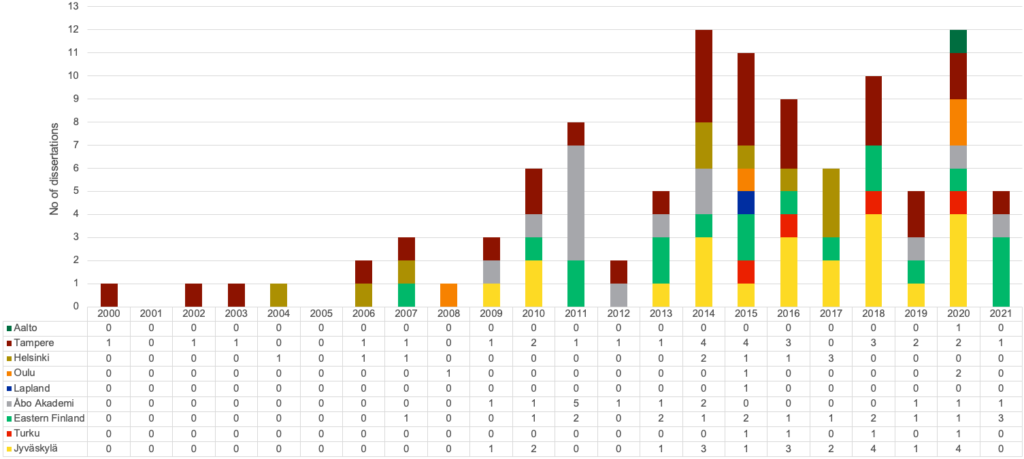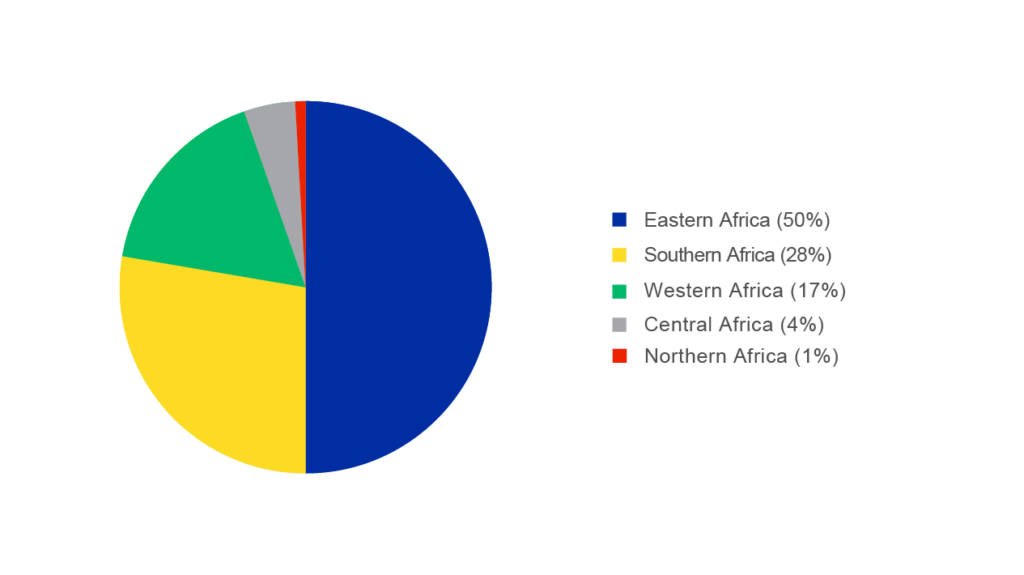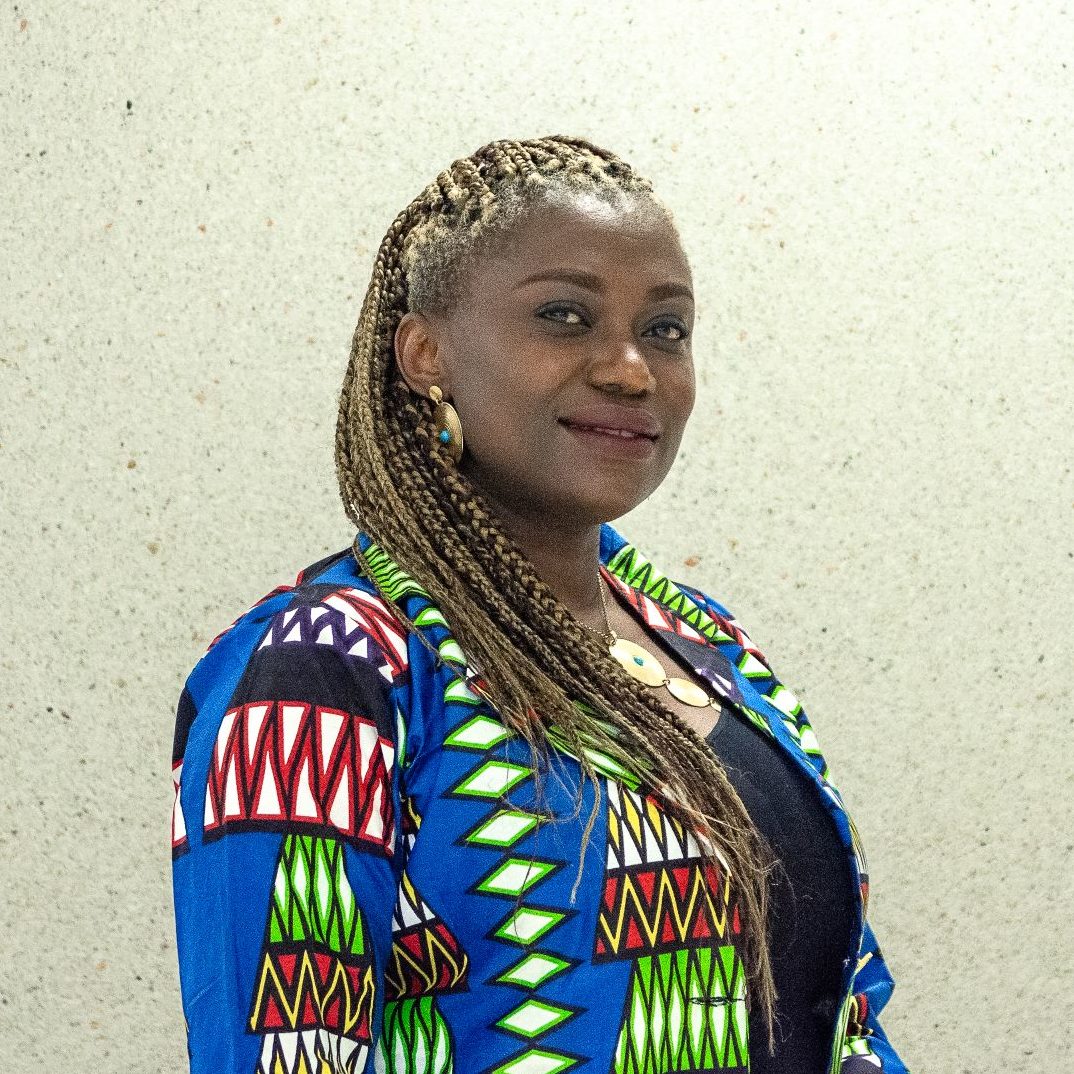Understanding Finland-Africa collaboration in knowledge creation via doctoral education

The Global Innovation Network for Teaching and Learning (GINTL) was created in 2021 as a gateway to: (1) Co-create research-based solutions to global education challenges and local needs; (2) Increase meaningful partnerships between GINTL higher education institutions (HEIs) and key allies; and (3) Inspire and initiate new internationalisation measures in Finnish HEIs.
Research is at the centre of achieving all three goals and there is already much research, especially through doctoral education, that has been conducted at Finnish universities on education development in the Global South. To further support and facilitate the co-creation of knowledge and research-based solutions, increase meaningful, sustainable and impactful partnerships, and initiate new internationalisation measures, GINTL looked two decades back to analyse doctoral dissertations on education development, completed in Finnish universities between 2000 and 2021 with a focus on Africa. The aim is to understand the already existing Finland-Africa collaboration in knowledge creation via doctoral education as a basis to achieving GINTL’s goals.
Research focus of doctoral dissertations on education development in Africa
Between 2000 and 2021, at least 104 doctoral dissertations that focus on education development in Africa were completed in nine Finnish universities. These universities are Tampere University (30 dissertations) University of Jyväskylä (22 dissertations), University of Eastern Finland (18 dissertations), Åbo Akademi University (14 dissertations), University of Helsinki (10 dissertations), University of Lapland (1 dissertation), University of Oulu (4 dissertations), University of Turku (4 dissertations), and Aalto University (1 dissertation) as shown in Figure 1 below.

Most of these dissertations were completed in 2014, 2015, 2018, and 2020 with more than 10 dissertations completed in each of these years. We notice a peak in the number of dissertations completed in 2014 and in 2020, with 12 dissertations completed in both years.
The level of education researched in these dissertations include primary, secondary and higher education, professional development and informal education, including knowledge creation within local communities of practice. In primary education, for example, focus of the doctoral dissertations has been on research related to early grade literacy, children with special needs, teacher training and professional development, socio-emotional development, and academic performance.
In analysing the doctoral dissertations, we were also interested in the dissertation type, that is, if the dissertations were article-based or monographs. Out of the 104 dissertations completed during the study period, 46 were article-based while 58 were monographs.
Doctoral dissertations beyond faculties of educational sciences
The mention of Aalto University in the figure above may be surprising to many. In our analysis, dissertations on education development were interpreted beyond dissertations completed at universities and faculties that offer doctoral training in Educational Sciences as classified by the Finnish Multidisciplinary Doctoral Training Network. We considered the broad field of education as categorised by the International Standard Classification of Education (ISCED) which includes:
00 – Generic programmes and qualifications
01 – Education
02 – Arts and humanities
03 – Social sciences, journalism and information
04 – Business, administration and law
05 – Natural sciences, mathematics and statistics
06 – Information and Communication Technologies
07 – Engineering, manufacturing and construction
08 – Agriculture, forestry, fisheries and veterinary
09 – Health and welfare
10 – Services
Broad fields of education in ISCED-F 2013
Hence, we included dissertations from the above-mentioned broad fields that had education related topics in the titles, keywords, abstracts, and objectives of the dissertations. Some of these topics included teaching, learning, education, training, educational programme, programme design, pedagogy, students, teacher, intervention, development, literacy, reading, knowledge, assessment, education technology, curriculum development, academic standards, professional development.
What is also interesting using this classification is the fact that it forces us to look deeper into the contribution other faculties in Finland—apart from faculties of Educational Science—are making in co-creating research-based knowledge with their counterparts in Africa towards the promotion of education development in Africa.
This explains our inclusion of Aalto university in the list. For example, some of these dissertations were conducted at faculties of Social Sciences, Medicine, Science and Forestry, School of management, Forestry and Natural Resources, School of Information Sciences, Health Sciences, Management and Business, Agriculture and Forestry.
National and regional distribution of the research focus of dissertations
18 African countries were the research focus of the doctoral dissertations analysed. These countries include Cameroon, Ethiopia, Kenya, Uganda, Gambia, Ghana, Nigeria, Liberia, Malawi, Namibia, Senegal, Tanzania, Egypt, Somali, South Africa, Mozambique, South Sudan, and Zambia. The dissertations comprised 1–4 case studies. While some multiple case studies involved African countries only, some were African countries and Finland or African countries and other European countries. Tanzania was the most researched context with 33 dissertations, followed by Malawi with 13 dissertations as seen in Figure 2 below.

These countries were further grouped into sub-regions in Africa—Central Africa, Eastern Africa, Northern Africa, Southern Africa, and Western Africa. As can be noticed from figure 2, Eastern Africa is the most researched sub-region accounting for 50% while the other 4 sub-regions make up the remaining 50%. Eastern Africa being the most researched context can partly be explained by the fact that, like many other areas of Finland’s development cooperation, the focus has been on Eastern Africa following Finland’s official development cooperation (ODC) partners. Tanzania, located in Eastern Africa, for example, has been Finland’s long-term development cooperation country since the 1970s, with Finland directing ‘its support to Tanzania to the development of forestry, the environment, education and good governance’ (Ministry for Foreign Affairs of Finland).
Implications of doctoral dissertation trends in advancing GINTL goals
Understanding the trends of doctoral dissertations on education development in Africa completed at Finnish universities is important in pushing forward GINTL’s work in Africa in at least two ways.
First, with regards to GINTL’s goal of co-creating research-based solutions to global education challenges with respect to Africa, it is important to examine how the research results of completed doctoral dissertations have or can be used to respond to the local education challenges in the different contexts. It is also important to look at the role the researchers of these doctoral dissertations can play in shaping and advancing research-based solutions to the global and local education challenges.
Second, as increasing meaningful partnerships and initiating new internationalisation measures are also two important goals of GINTL, reflecting and being intentional in the ways GINTL can advance partnerships beyond Finland’s ODC partner countries can facilitate inclusive internationalisation strategies.
The author

Elizabeth Eta
Postdoctoral Researcher, Global Innovation Network for Teaching and Learning (GINTL)
elizabeth.eta[at]helsinki.fi | Research portal













